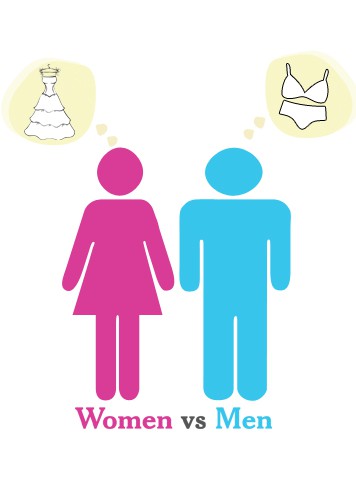“Women see and hope for tomorrow, while men simply act on impulse and don’t plan so far ahead”
It is safe to say that men and women are different. We function differently, process things differently, prioritize differently; we simply understand life differently in many of its aspects. These differences go as deep as our motives for doing the very same things, like why we work, or why we buy stuff, or why we marry.
In light of this difference, it is also safe to say that men and women can understand the same thing differently; simple words like commitment or love or forever. This article will speak specifically about these interpretations as far as relationships are concerned.
Men and women define relationships and the words that describe them differently. Thus, we act upon them differently. And it is this variation that seeds many of the misunderstandings that occur between us, sometime to irreconcilable extents.
When a man tells a woman that he likes her, for instance, his understanding of what he just said is usually completely different than hers. His interpretation of the term “like” is (probably) something along the lines of: you’re interesting and good looking; I’d like to spend more time with you. Nothing more, nothing less; just that. To spend more time with you.
A woman would understand such a statement in a completely different manner. We women tend to read between the lines, even if there is nothing there to read. Such a statement would thus be – unconsciously – interpreted into something along the lines of: He’d like to spend more time with me; this is a potential forever. This approach automatically and unconsciously leads us to unrealistic expectations and, thus, damaging disappointments.
Women see and hope for tomorrow, while men simply act on impulse and don’t plan so far ahead, especially where relationships are concerned. Sadly though, in this day and age, so many clashes have occurred due to this misunderstanding that men have become more and more reluctant to expressing their admiration of women altogether. In fear of being misunderstood as making a promise or committing to the woman, a man will refrain from showing his interest in her in the first place, lest he be burdened with expectations that he never really knew were expected of him at all.
There is rarely an occasion when the two people involved understand the man’s approach correctly. The man shows interest and, simultaneously, the woman is waiting for the next step. We are in two completely different places and, as a result, we end up in two completely different places.
The same also applies the other way around. If a woman decides to break the taboo and approach a man by expressing her admiration of him, she is simply stating that she likes the person and believes there is potential there. The man, however, as a result of built up misconceptions over time and societal pressures, will interpret her approach as either a sign of her being too liberal for him or a turnoff for God-knows-what reason. In reality, it is all the result of different interpretations to the exact same words.
The finale of all this confusion forms one of the most talked about dilemmas we are faced with today; women staying single because men aren’t approaching them and men staying single because they’re too afraid to approach women.
Simplifying is much more difficult than complicating. We have succeeded in complicating simplicity to damaging extents.
A simple statement such as, “Let’s have dinner” should not be interpreted as a date and, at the same time, a man should not linger too long in the “getting to know you” phase. The lesser the expectations, the lesser the disappointments.
The clearer and simpler we are, the better we understand each other, especially when we know that our genders – by default – interpret the same things differently.
Poh-tay-to is not po-tah-to.

